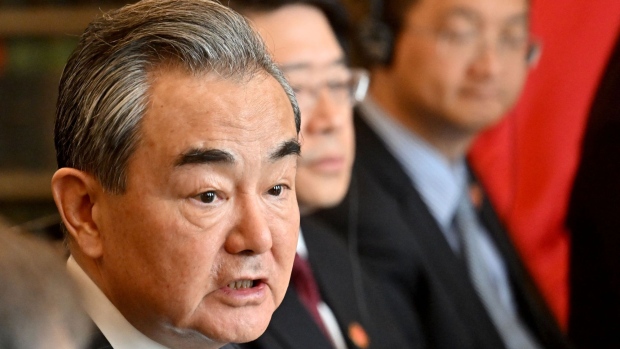Feb 21, 2023
China Calls Russia Ties ‘Solid as Rock’ Amid Ukraine Peace Push
, Bloomberg News

(Bloomberg) -- President Vladimir Putin said he’s waiting for his Chinese counterpart Xi Jinping to visit Russia as he hailed deepening ties with Beijing at talks with China’s top diplomat.
Cooperation between Russia and China is “very important for stabilizing the international situation,” Putin told Chinese State Councilor Wang Yi at talks in Moscow on Wednesday, asking him to pass on greetings to “my friend” Xi. Russia and China are reaching “new milestones” including in trade, which may grow to $200 billion sooner than their goal of 2024, Putin said.
“The current international situation is indeed critical and complex but the relationship between China and Russia is solid as a mountain and can stand the test of international risks,” Wang replied, adding that the “strategic” ties between Moscow and Beijing won’t be subject to pressure from any third parties.
Wang’s visit to Moscow roughly a year after Putin ordered a full-scale invasion of Ukraine shows that China has little intention of abandoning its staunch diplomatic partner despite Beijing’s efforts to limit the damage caused by the war. China has said it will soon release details of a plan to bring peace in Ukraine, a proposal met with skepticism in the US and Europe.
US Secretary of State Antony Blinken warned Wang at weekend talks in Munich against China providing lethal aid to Putin’s war, even as Beijing moves to portray itself as a neutral actor that can broker peace in Ukraine.
“We’re monitoring, very vigilantly, for potential violations,” State Department spokesman Ned Price said Wednesday. The US doesn’t believe China has ruled out such support, he added.
Wang and Russian Security Council Secretary Nikolai Patrushev affirmed at talks on Tuesday that their nations are aligned in pushing back against the US and its allies, pledging to “jointly practice true multilateralism, oppose all forms of unilateral bullying, and promote democracy in international relations and a multi-polar world.”
Patrushev was present with Putin at the Kremlin meeting along with Russian Foreign Minister Sergei Lavrov, who’d held separate talks with Wang earlier Wednesday.
The Wall Street Journal reported that Xi was preparing to visit Moscow in the coming months to push for multiparty peace talks and allow China to reiterate its calls that nuclear weapons not be used. A potential visit has been floated for months, with Putin telling Xi during a December video call that he looked forward to welcoming the Chinese leader to Russia in the spring.
Putin said this week that Russia will suspend its participation in the New START treaty with the US, dealing a blow to the last accord limiting their nuclear arsenals. Biden called the decision a “big mistake,” though added he does not believe it signals the Russian leader will use nuclear weapons.
Xi has yet to talk with Ukrainian President Volodymyr Zelenskiy since the invasion despite speaking with Putin some four times in that span. Beijing has also repeatedly defended some of Russia’s reasons for going to war — most prominently to resist the expansion of NATO — while insisting it doesn’t support the invasion itself.
While Beijing remains close to Russia, the costs of their partnership have become more apparent of late. Beyond the near-term damage to the global economy, China is also increasingly seen in the US and Europe as a strategic competitor that must be deterred from its own ambitions to take control of Taiwan — a prospect that makes Beijing more vulnerable to multilateral export controls, investment restrictions and other measures that could thwart its long-term growth prospects.
In a phone call with Lavrov in early January, new Chinese Foreign Minister Qin Gang said ties were based on “Three Nos:” no alliance, no confrontation and no targeting of any third party. Chinese participants at a security conference in Germany last weekend also sought to downplay the significance of a “no-limits” partnership that Xi and Putin agreed to last year just weeks before the Russian leader invaded Ukraine.
Japan, a key US ally in Asia, expressed concern about China’s joint military exercises with Russia around its shores in the first security dialog between officials from Tokyo and Beijing since 2019, according to a statement issued by Japan’s Ministry of Defense. China and Russia conducted joint drills in waters off Japan several times last year.
For their part, the Chinese officials said they were extremely worried about what they saw as negative Japanese actions regarding Taiwan in collusion with forces outside the region, public broadcaster NHK reported.
The two Asian neighbors did agree to continue to work toward bringing a military hotline into operation in the spring, the ministry said.
In a security dialog between Japanese and Chinese diplomats and defense officials Wednesday, China said it expressed its “stern position and serious concern with the negative movements” of Japan on issues including Taiwan and the South China Sea.
--With assistance from Isabel Reynolds, Foster Wong and Zibang Xiao.
(Updates with details throughout.)
©2023 Bloomberg L.P.








